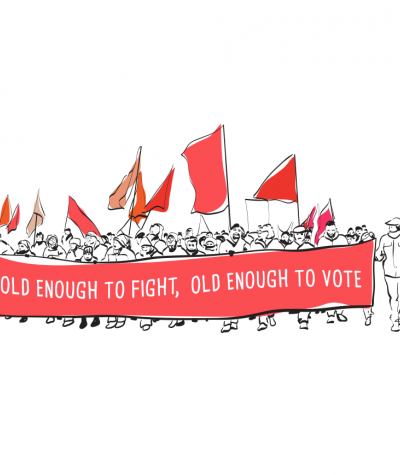Congress proposed the 26th Amendment of the U.S. Constitution to lower the voting age to 18 for all local, state, and federal elections on March 23, 1971. This victory affirmed the right of all legal adults to participate in the democratic process.
The 26th Amendment was borne of youth activism. At the height of the Vietnam War, young people fought to lower the voting age, protesting that 18-year-olds should be allowed to vote if they were forced into armed services.
In response, Congress passed the Voting Rights Act Amendments of 1970 to lower the voting age in all local, state, and federal elections. The Supreme Court, however, struck down these provisions of the 1970 amendments as to state and local elections in Oregon v. Mitchell, catalyzing the project of amending the Constitution to lower the voting age for all elections.
Only three months after Oregon v. Mitchell, Congress introduced an act to amend the Constitution. States quickly ratified the amendment, and the 26th Amendment was ratified into the Constitution by July 1971.
Today, the 26th Amendment represents the importance of the franchise to young voters, and the continued ability of the youth vote to spark nationwide change. In 2018, voters aged 18-to-29 increased their turnout to the highest level for the age group since the 1930s.
In 2020, increased youth voter turnout was estimated to play a key role in several swing states, affecting the outcome in states including Pennsylvania, Michigan, Georgia, North Carolina, Wisconsin, and Arizona.
Now states across the country are pushing forward legislation that would significantly curtail the right to vote for young people. Forty-three states have together introduced over 250 bills to restrict voting access.
Many of these bills either directly target young people or disproportionately affect them. For example, a series of New Hampshire bills would prohibit the use of student identification as valid voter identification and prohibit students from using their college residences as their domicile for voting.
Several states have introduced bills which would make the signature requirement more difficult for mail-in ballots; other states have introduced bills to cut the early voting period; and others still have introduced bills to restrict access to vote by mail.
All of these restrictions are likely to disproportionately impact young voters, many of whom are students that rely on vote-by-mail and early voting to access the ballot while studying away from home. Despite the rapidly increasing turnout rate for voters aged 18-to-29, states seek to limit that access and undermine the youth vote.
Now more than ever, reform is required at the federal level to affirm the right of youth voters. Young voters are more mobile, move around more often, and have less access to government services.
As a result, cutting off alternative methods of voting can make the barriers to voting insurmountable. The For the People Act, H.R. 1/S. 1, would make it possible for voters traditionally denied access to the ballot box, including students and young people, to cast their ballot.
For young voters, the passage of this bill would be monumental. Among other provisions, it provides for vote by mail and early voting in every federal election.
H.R. 1/S. 1 also incorporates the provisions of the Help Students Vote Act—first introduced in Congress in 2019—which would require federally-funded colleges and universities to designate a Campus Vote Coordinator to provide voter registration and voting information to college students.
Finally, the For the People Act would require states to preregister voters beginning at age 16 and provide online voter registration for federal elections. Essentially, the bill would not only ensure that young voters are not denied access to the ballot box based on the unique circumstances they face but also embrace and encourage young voters to participate.
Americans endorse states’ efforts over the past year to give voters more options for voting, with a 70% majority of voters approving of these changes. Only 26% disapprove. On the 50th anniversary of the 26th Amendment, Congress should pass the For the People Act to prevent invidious state election bills from curtailing the right to vote for young adults.
Young adults have as much of a stake in the democratic process as any other group. Indeed, they are the generation that will live with the consequences of the decisions are election officials make for the longest. They deserve a voice in shaping their future.
State laws that restrict the right to vote discourage participation by young voters and prevent them from accessing the ballot box. As we commemorate the 26th Amendment, we must protect young voters from efforts to suppress their votes.

